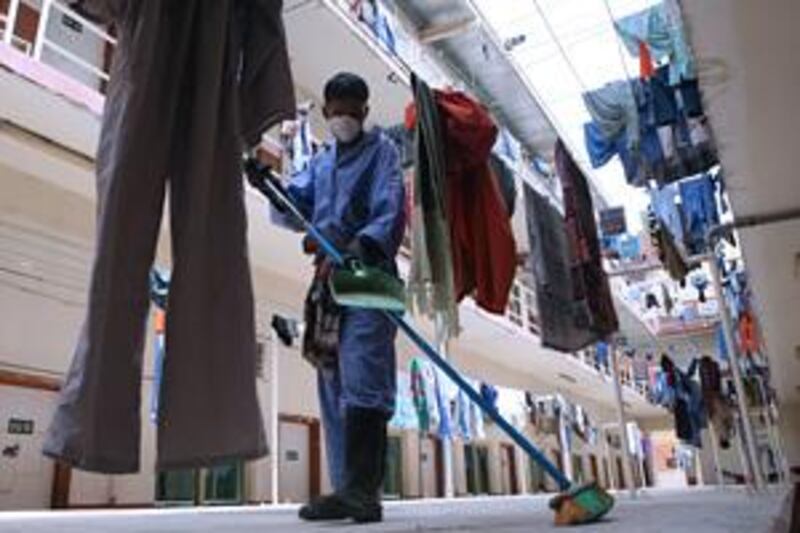DUBAI // Arabtec, one of the region's largest construction companies, yesterday said it had been warned by the Ministry of Labour about overcrowding and sanitary conditions at some of its labour camps. It acknowledged it must improve some aspects of workers' living conditions and pledged to soon close a temporary labour camp in Dubai that became the focus of a BBC documentary.
In a tour of one of its labour camps organised for the media yesterday, the company sought to outline plans for improvements and answer some of the allegations made against it in the BBC Panorama documentary. Arabtec, which employs more than 60,000 workers, said it would close the Nad al Sheba camp within months, instead of waiting until the end of the year. The company also said it had already reduced the number of men living per room at its camps, from eight to six, and had stepped up efforts to maintain cleanliness.
It also pledged to speed up the transfer of labourers out of Nad al Sheba. The documentary asserted that "exploited" labourers in Nad al Sheba lived in filthy conditions without basic sanitation and that raw sewage was flowing through the camp. It also alleged that labourers were not allowed to go home and that some were unable to afford meat. While conceding shortcomings, Arabtec has denied most of the claims in the documentary.
"As soon as the documentary was aired ministry officials visited the camps and gave us a few cautions, which we responded to immediately," said Ammar al Hejjawi, the co-ordinator of all 20 Arabtec camps. Company officials denied that workers lived in cramped and filthy conditions. They attributed the sewage problems to rain in Dubai on the day of filming. "Because the water table is high in the Nad al Sheba area, the overflowing problem is always there," said Riad Kamal, Arabtec's chief executive.
"To overcome this," he said, "we have built four septic tanks in the camp to prevent the overflowing in toilets, kitchens and accommodations." Mr Kamal said each of 28 tankers were removing up to 10,000 gallons of waste each, costing the company Dh56,000 (US$15,000) a day. Senior staff at Arabtec also acknowledged that a large number of workers could not read or write their own language, an issue they attributed to unscrupulous overseas recruiters.
It is illegal to work in the UAE without a basic high school diploma. Laxmi Montgomery, Arabtec's welfare officer, said few recruits were coming from India's Kerala state, where the literacy rate was high. Recruitment companies in India, she said, were instead going to other states take advantage of people unable to read or write by charging them high fees. "We still end up paying for visas and annual flights for workers," she said.
Ms Montgomery is responsible for training and educating Arabtec's labourers in Dubai. She said the company intended to bypass recruitment agencies by sending its own staff to India and other countries, and that it was considering debt management classes for those falling victim to unscrupulous recruitment agencies. For its documentary, Slumdogs and Millionaires, the BBC sent an undercover reporter to the Nad al Sheba camp, which it said housed up to 7,500 labourers in 1,248 rooms with poor ventilation.
The camp manager, Tareq Ali, yesterday said 6,063 labourers were living in the camp, the rest having been laid off for financial reasons. "We know the identities of those who spoke to the BBC and we did not prosecute them and don't plan to," Mr Ali said. "There was a problem at the time with the sewage but that is mainly down to the rain at the time." Arabtec officials said the producers did not approach the company for comment.
The Ministry of Labour said last week it would step up its campaign against those who violated the rights of workers. A ministry official, however, said Arabtec was not expected to be among them. "We will not be fining Arabtec," the official said. "Their conditions are generally good." The flooding shown in the documentary was due to heavy rain, he said, which the company cleared within days. The ministry is targeting unscrupulous recruitment agencies by establishing offices abroad and launching a six-language pamphlet aimed at educating labourers about their rights.
Late last year, the Government pledged to crack down on companies that failed to provide adequate housing for workers. @Email:shafez@thenational.ae






